Items
Tag is exactly
student
-
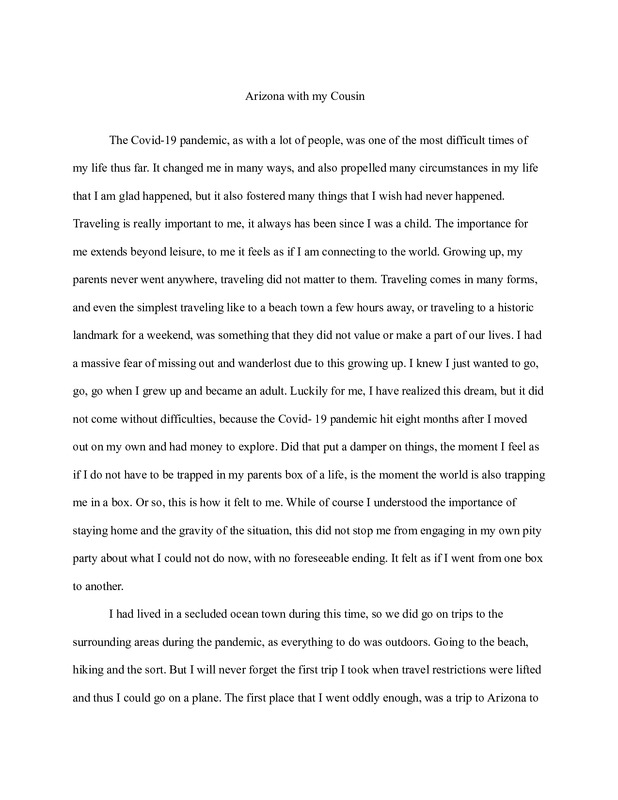 2021-05-20
2021-05-20Arizona with my cousin
This is a story about the first time I traveled post COVID restrictions lifting. This story comments on how isolating the pandemic felt to many of us and thus the importance of traveling once we were able to. This particular story is important to me because it was the first trip I had taken by myself as a newly moved out adult. -
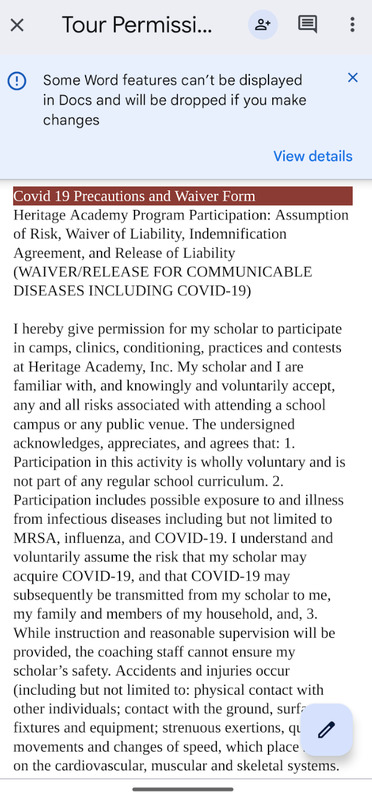 2022-03
2022-03School Trip to New York COVID-19
As a school, we take a trip to New York and Boston every other year. We had planned to take a trip in October 2021 but many of the venues in New York were still closed so we had to postpone until spring 2022. Even then, there were still a lot of students who did not want to get the vaccine that was required to enter all indoor venues at the time. We had to split the trip so those without vaccinations could go later when the mandate was lifted. There were still mask mandates and we had to present our vaccination cards at every venue. Despite the restrictions though, we had a great time in New York. -
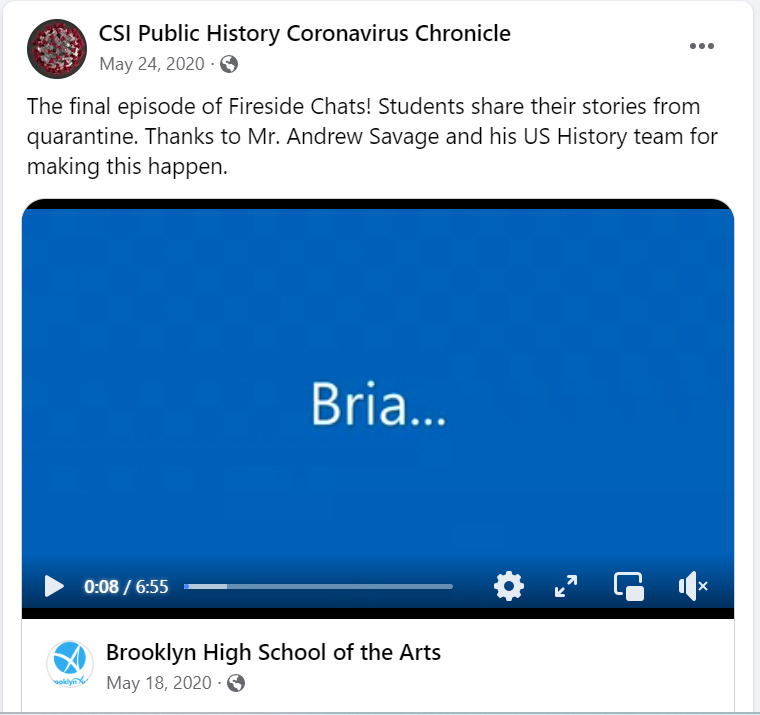 2020-05-24
2020-05-24Fireside Chat Final Episode
The final episode of Fireside Chats! Students share their stories from quarantine. Thanks to Mr. Andrew Savage and his US History team for making this happen. -
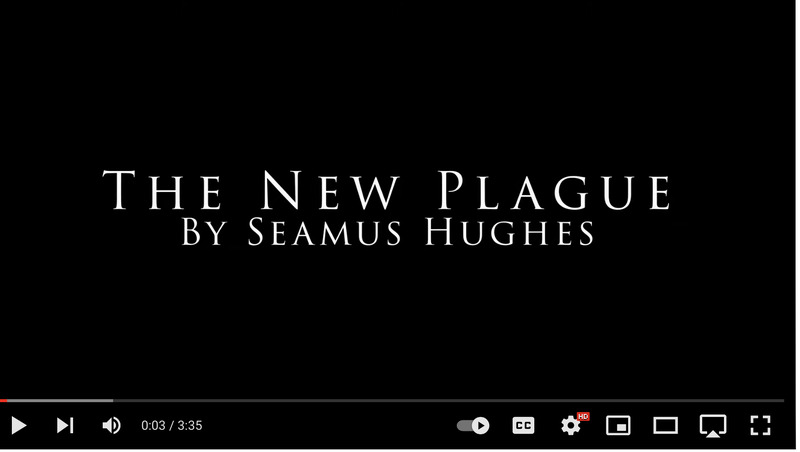 2020-04-06
2020-04-06The New Plague
Life in Self-isolation, "Love in the Time of COVID-19" Project, CIN 211 College of Staten Island -
 2022-08-02
2022-08-02HST 580 Professional Experience/Archives course
The online history MA program in conjunction with the public history program at Arizona State University ran an internship for history graduate students to work on the JOTPTY archive. Internships were held in summer 2020, fall 2020, spring 2021, and spring 2022. Students were asked to submit to the archive and were often given guided assignments. The nature of the submissions varied from contributing to a specific collection to conducting an oral history. In the first internship participants developed collections and began creating calls for submissions and collecting for specific collections. In the Fall 2020 semester, students continued adding to collections and worked more extensively on oral histories. In Spring 2021, more interns experimented with the Omeka exhibits feature and finally in Spring 2022 a large portion of the internship was dedicated to data cleaning and a self-directed project. As part of their 180 hours, students were always encouraged to share their own pandemic stories or respond to varied prompts. Internship Director: Kathleen Kole de Peralta -
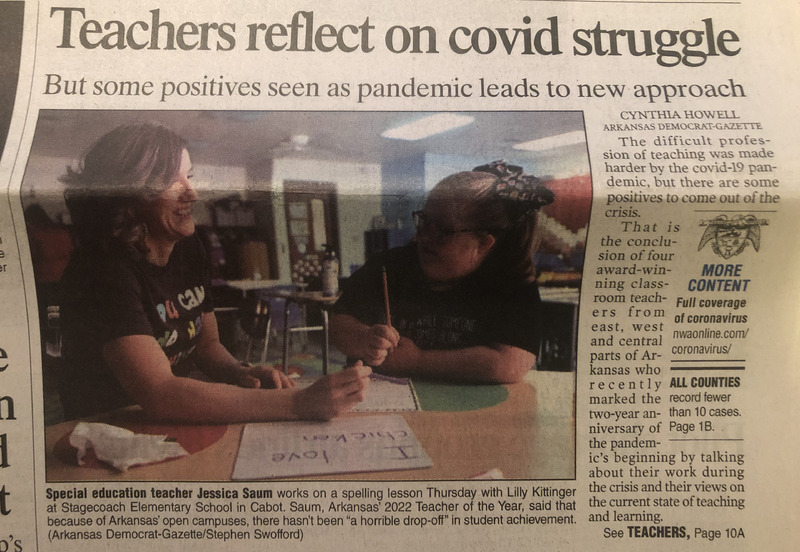 2022-04-03
2022-04-03Teachers reflect on covid struggle
This article details the reflection of a few Arkansas teachers as we reach two years since the beginning of the pandemic. The teachers highlight the drastic changes not only in safety precautions, but also the adjustments in order to provide meaningful learning in an entirely new landscape. Many of the teachers reported excitement at the prospect of a return to normalcy, however they desire some aspects of the pandemic adjustments to remain in place. Flexible learning, new and creative ideas of conveying topics, and more individualized learning methods have seen an increase in retention of material, which is fundamentally what education is all about. The teachers would also like an end to the stigma surrounding the covid learning adjustments, primarily the notion that education is now "entirely computer based". This notion is quite the contrary, according to educators, rather the new methods not only encourage flexibility and invite individualized learning but also promotes computer skills which will be vital for adulthood. I think this article is interesting because it highlights the fundamental change covid has made and continues to make on society. In order to promote public health and safety, teachers were forced to adjust and were forced to rework how they educated. This compelling of behavior has rendered some positivity. I think it is critical that children are able to have the safest and most effective education, and while covid seems terribly negative, there is a small glimmer of improvement from the pre-pandemic world. This article was published in the Northwest Arkansas Democrat Gazette. -
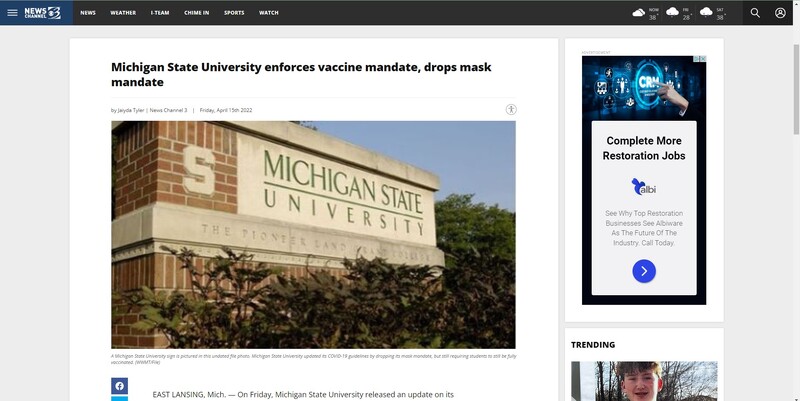 2022-04-15
2022-04-15Michigan State University enforces vaccine mandate, drops mask mandate [PRIVATE]
This is a text story from Channel 3 News by Jaiyda Tyler. This is about Michigan State University and the mandates for that university. The university has decided to drop the mask mandate, but enforce the vaccine mandate. This new policy will require all participating in the 2022-2023 academic school year to be fully vaccinated and to have received a booster shot. This mandate will affect people participating in the summer 2022 session. All students that do not submit their vaccine information will be prevented from enrolling in the summer 2022 and fall 2022 sessions at MSU. -
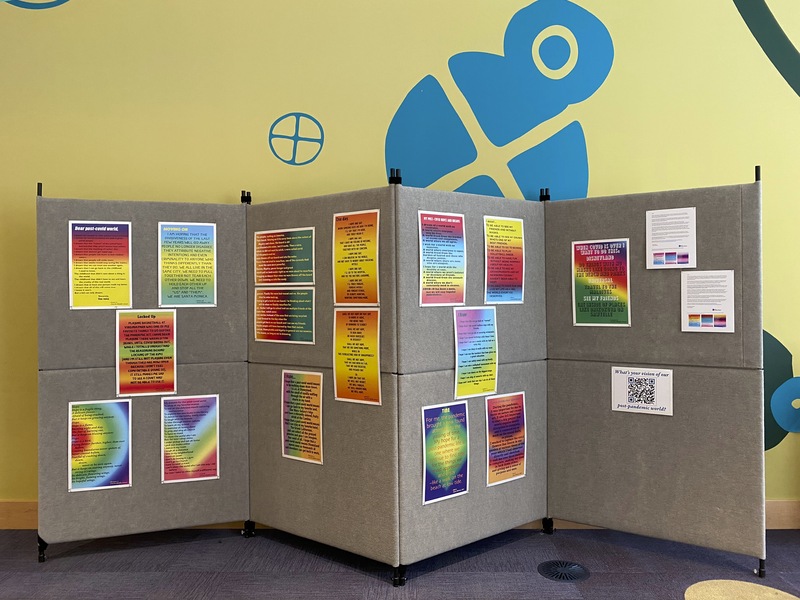 0002-03-01
0002-03-01SMhopes at the SMPL Teen Lounge
A variety of submissions to the SMhopes website, designed as posters and banners by Paula Goldman, and installed in the Teen Lounge at the main branch of the Santa Monica Public Library. The Library asked for a variety of hopeful messages as they begin having students visit the Teen Lounge again. -
2020-06-27
Graduation
This picture, it is showing me having my high school graduation in a parking lot. All having to stand 6 feet apart, outside and listen to our names being read off through the speaker of our cars. Not your typical graduation from high school and I'll never get to go back and have one because of covid. -
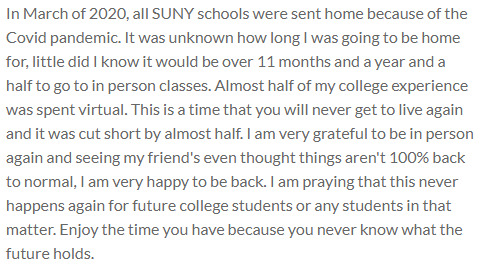 2022-02-06
2022-02-06Covid: College Edition
In March of 2020, all SUNY schools were sent home because of the Covid pandemic. It was unknown how long I was going to be home for, little did I know it would be over 11 months and a year and a half to go to in person classes. Almost half of my college experience was spent virtual. This is a time that you will never get to live again and it was cut short by almost half. I am very grateful to be in person again and seeing my friend's even thought things aren't 100% back to normal, I am very happy to be back. I am praying that this never happens again for future college students or any students in that matter. Enjoy the time you have because you never know what the future holds. -
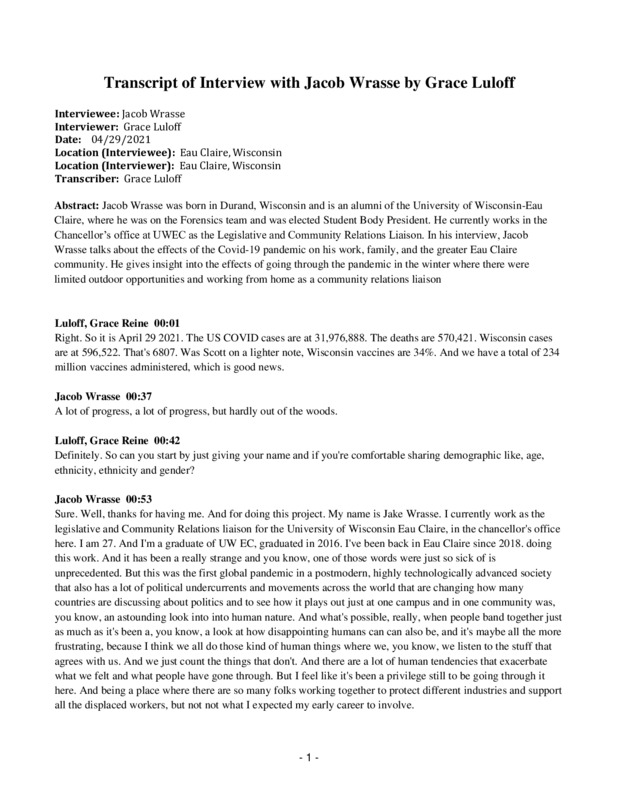 04/29/2021
04/29/2021Jacob Wrasse Oral History, 2021/04/29
Jacob Wrasse was born in Durand, Wisconsin and is an alumni of the University of Wisconsin-Eau Claire, where he was on the Forensics team and was elected Student Body President. He currently works in the Chancellor’s office at UWEC as the Legislative and Community Relations Liaison. In his interview, Jacob Wrasse talks about the effects of the Covid-19 pandemic on his work, family, and the greater Eau Claire community. He gives insight into the effects of going through the pandemic in the winter where there were limited outdoor opportunities and working from home as a community relations liaison -
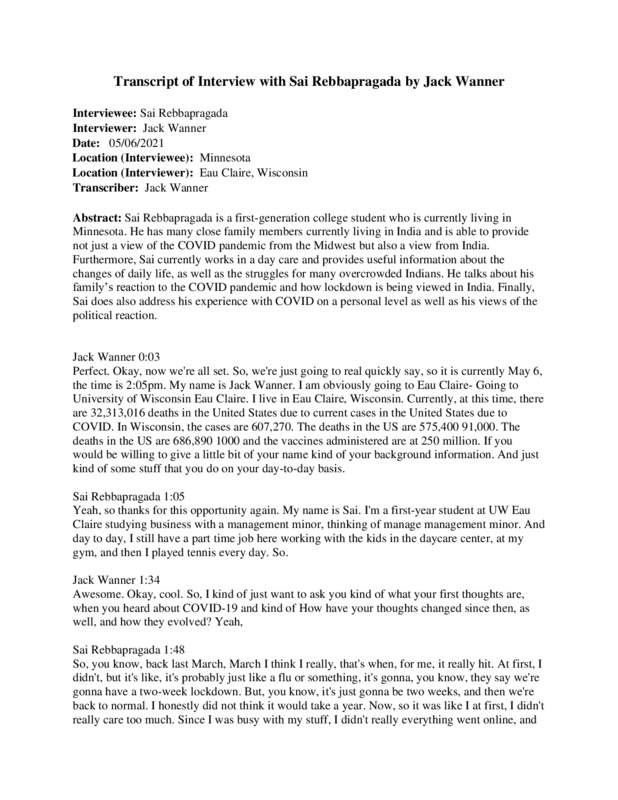 05/06/2021
05/06/2021Sai Rebbapragada Oral History, 2021/05/06
Sai Rebbapragada is a first-generation college student who is currently living in Minnesota. He has many close family members currently living in India and is able to provide not just a view of the COVID pandemic from the Midwest but also a view from India. Furthermore, Sai currently works in a day care and provides useful information about the changes of daily life, as well as the struggles for many overcrowded Indians. He talks about his family’s reaction to the COVID pandemic and how lockdown is being viewed in India. Finally, Sai does also address his experience with COVID on a personal level as well as his views of the political reaction. -
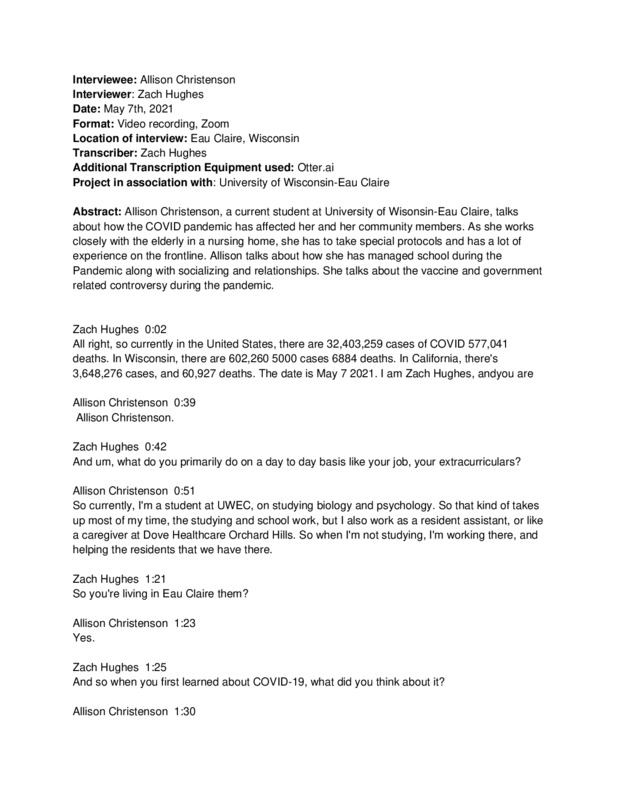 05/07/2021
05/07/2021Allison Christenson Oral History, 2021/05/07
Allison Christenson, a current student at University of Wisonsin-Eau Claire, talks about how the COVID pandemic has affected her and her community members. As she works closely with the elderly in a nursing home, she has to take special protocols and has a lot of experience on the frontline. Allison talks about how she has managed school during the Pandemic along with socializing and relationships. She talks about the vaccine and government related controversy during the pandemic. -
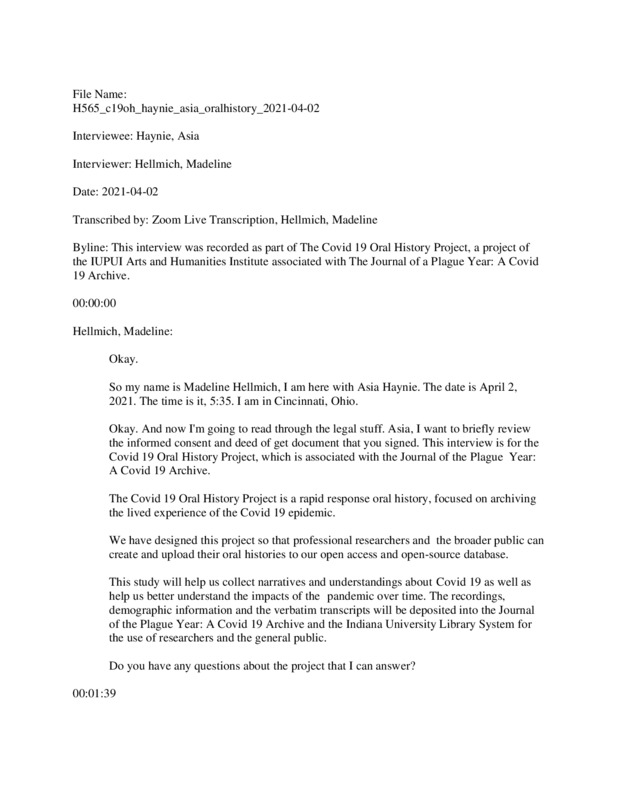 04/06/2021
04/06/2021Asia Haynie Oral History, 2021/04/06
Personal narrative towards understandings about Covid-19 to further the understanding of the impacts of the pandemic over time. -
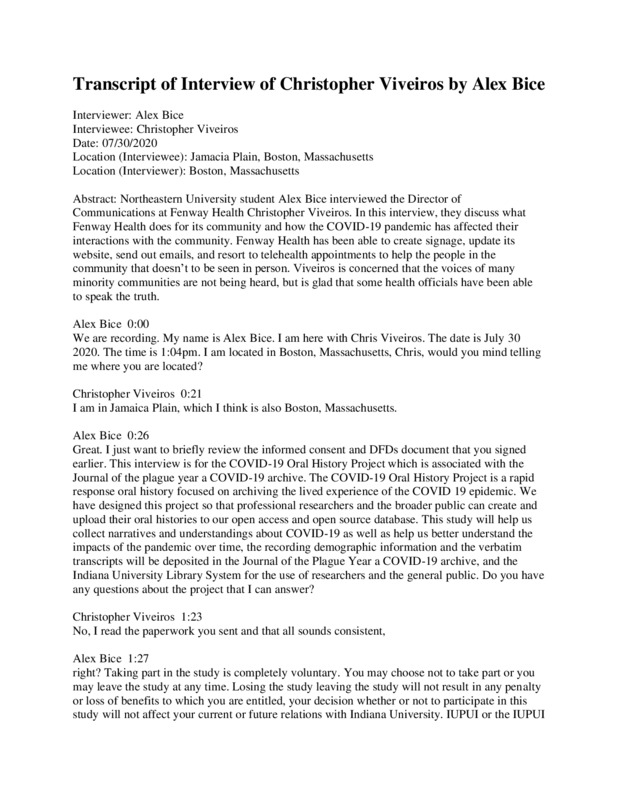 07/30/2020
07/30/2020Christopher Viveiros Oral History, 2020/07/30
Northeastern University student Alex Bice interviewed the Director of Communications at Fenway Health Christopher Viveiros. In this interview, they discuss what Fenway Health does for its community and how the COVID-19 pandemic has affected their interactions with the community. Fenway Health has been able to create signage, update its website, send out emails, and resort to telehealth appointments to help the people in the community that doesn’t to be seen in person. Viveiros is concerned that the voices of many minority communities are not being heard, but is glad that some health officials have been able to speak the truth. -
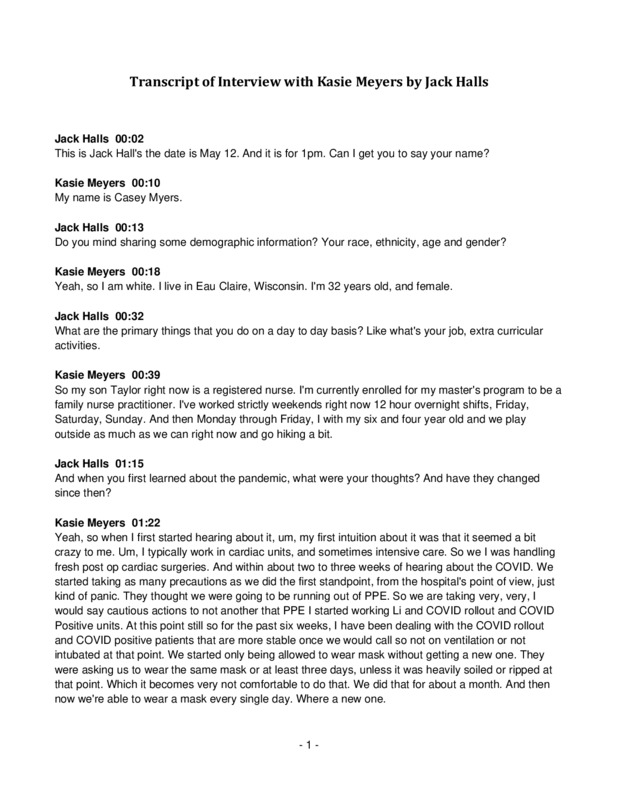 05/12/2020
05/12/2020Kasie Meyers Oral History, 2020/05/12
Interview with Kasie Meyers by Jack Halls. In this interview, Kasie Meyers discusses how COVID has impacted her role as a nurse and the changes she and her colleagues face. She also discusses her journey as a student and how covid has impacted her studies, she touches on her role as a mother and the difficulties that have been heightened because of the pandemic. She expresses how her relationships with friends and family have changed and also discusses her view on the government and its handling of the pandemic. -
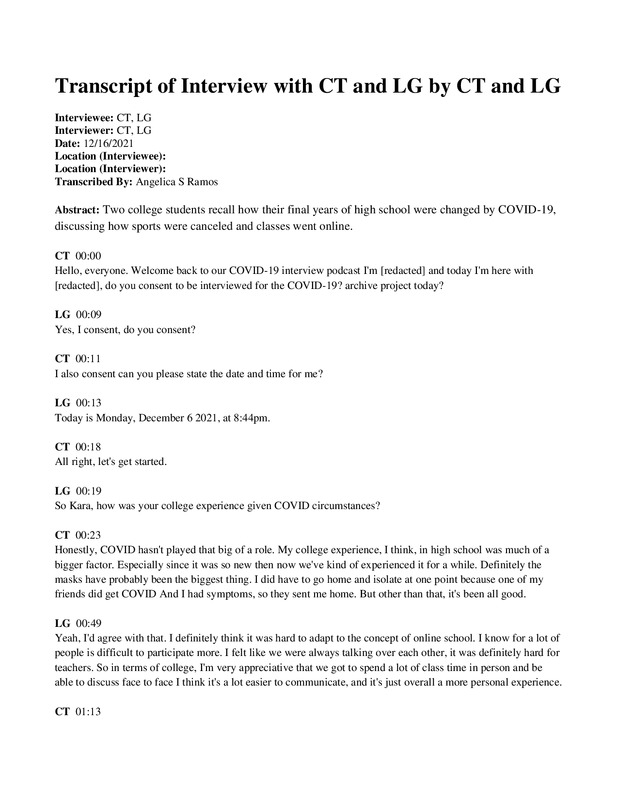 2021-12-16
2021-12-16CT and LG Oral History, 2021/12/16
This is the second part of a podcast by two college students. In this part they discuss the similarities they have found in how they experienced COVID and what they learned about past pandemics. -
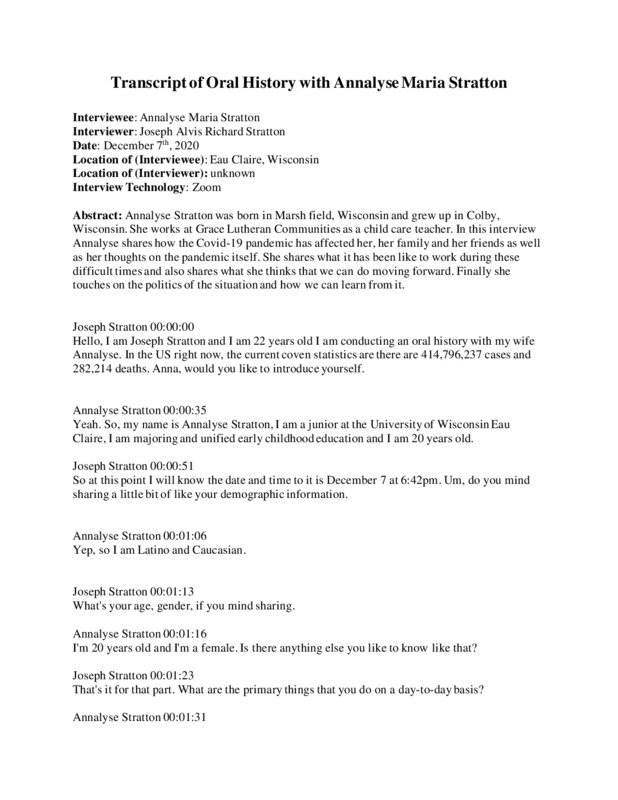 12/11/2020
12/11/2020Annalyse Stratton Oral History, 2020/12/11
Annalyse Stratton was born in Marsh field, Wisconsin and grew up in Colby, Wisconsin. She works at Grace Lutheran Communities as a child care teacher. In this interview Annalyse shares how the Covid-19 pandemic has affected her, her family and her friends as well as her thoughts on the pandemic itself. She shares what it has been like to work during these difficult times and also shares what she thinks that we can do moving forward. Finally she touches on the politics of the situation and how we can learn from it. -
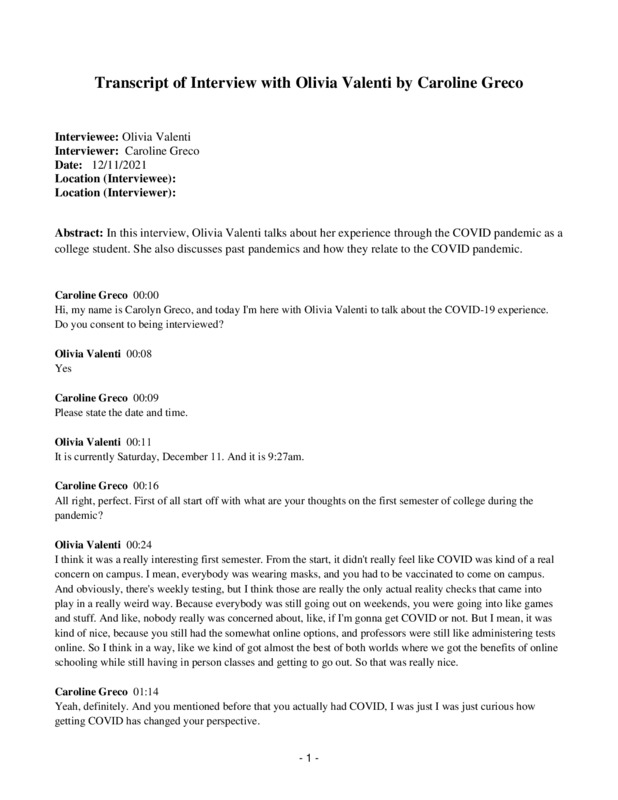 2021-12-11
2021-12-11Olivia Valenti Oral History, 2021/12/11
It illustrates what college was like during the pandemic -
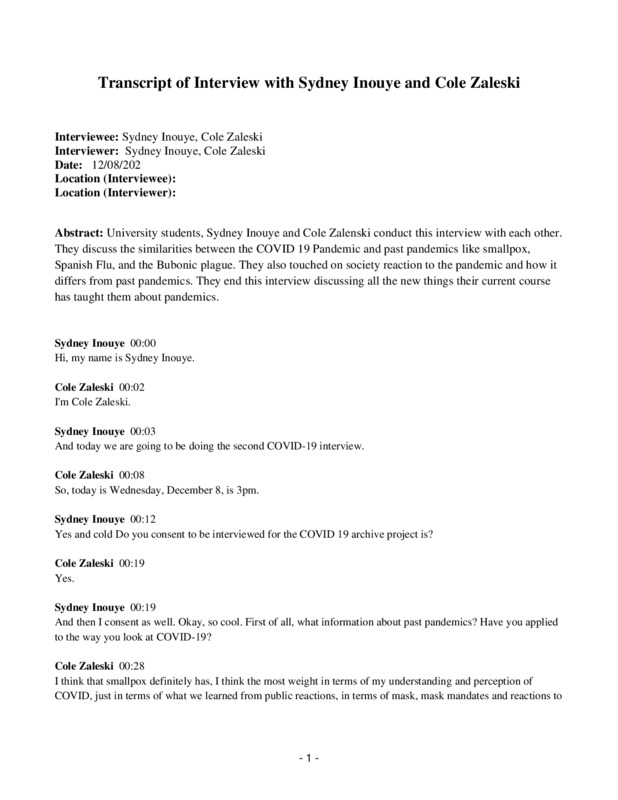 2021-12-08
2021-12-08Sydney Inouye, Cole Zaleski Oral History, 2021/12/08
We are discussing the comparisons between COVID-19 and previous pandemics, as well as how the pandemic has impacted our first year of college. -
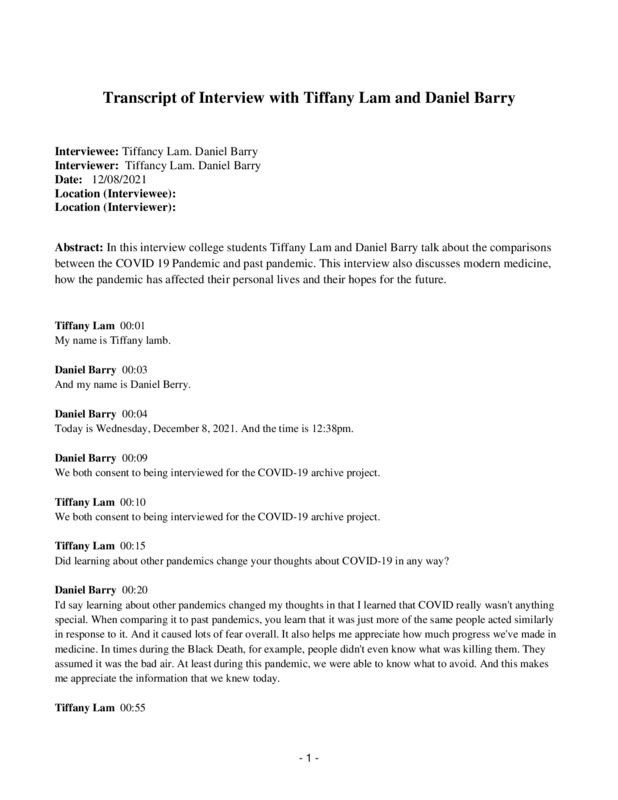 2021-12-08
2021-12-08Tiffany Lam and Daniel Barry Oral History, 2021/12/08
It connects the COVID pandemic to past pandemics, and the future. -
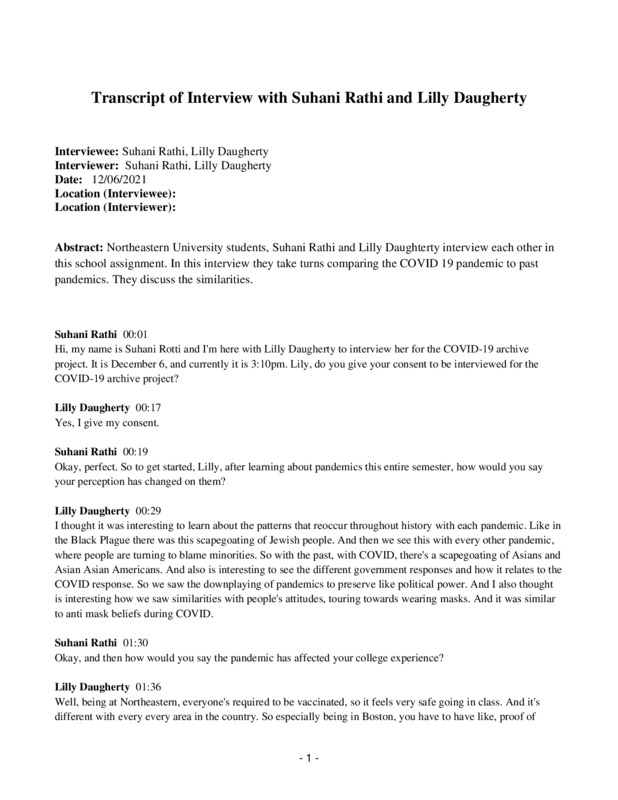 2021-12-06
2021-12-06Suhani Rathi and Lilly Daugherty Oral History, 2021/12/06
Northeastern University students, Suhani Rathi and Lilly Daughterty interview each other in this school assignment. In this interview they take turns comparing the COVID 19 pandemic to past pandemics. They discuss the similarities. -
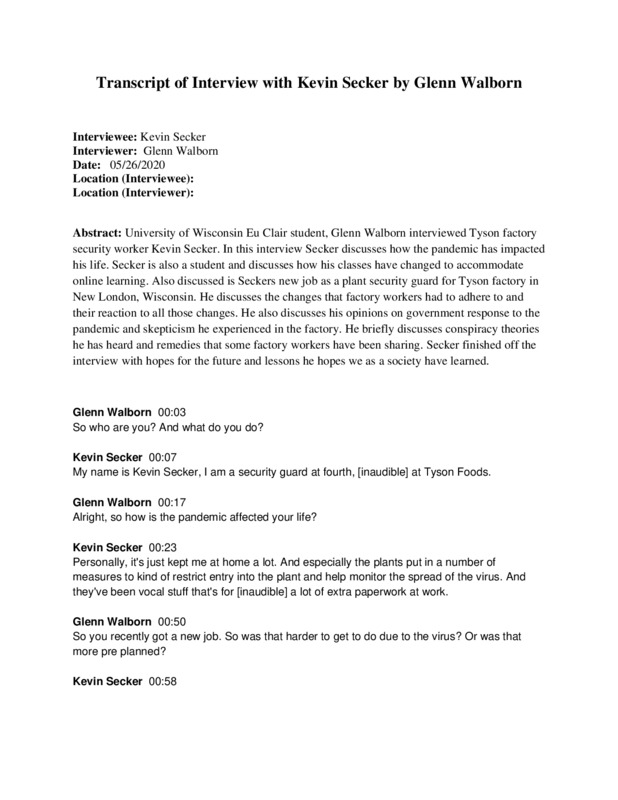 05/16/2020
05/16/2020Kevin Secker Oral History, 2020/05/16
University of Wisconsin Eu Clair student, Glenn Walborn interviewed Tyson factory security worker Kevin Secker. In this interview Secker discusses how the pandemic has impacted his life. Secker is also a student and discusses how his classes have changed to accommodate online learning. Also discussed is Seckers new job as a plant security guard for Tyson factory in New London, Wisconsin. He discusses the changes that factory workers had to adhere to and their reaction to all those changes. He also discusses his opinions on government response to the pandemic and skepticism he experienced in the factory. He briefly discusses conspiracy theories he has heard and remedies that some factory workers have been sharing. Secker finished off the interview with hopes for the future and lessons he hopes we as a society have learned. -
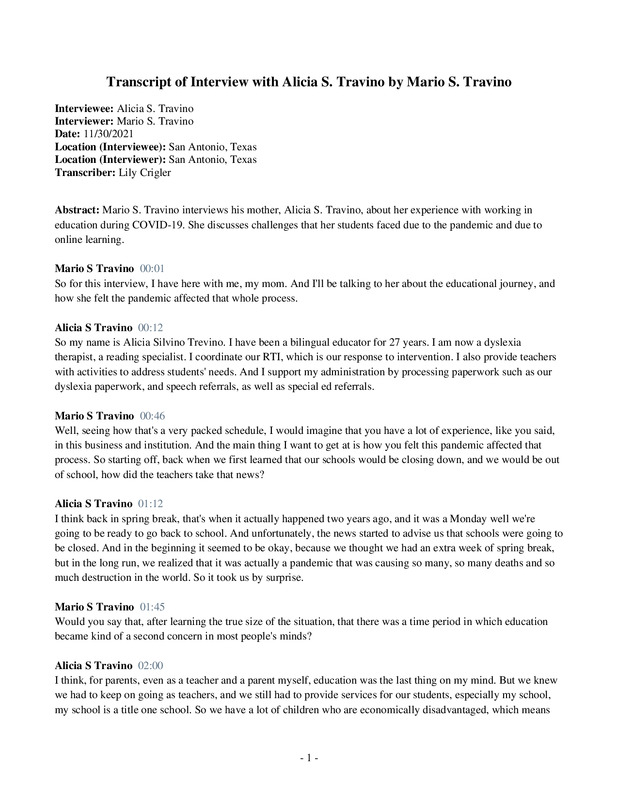 2021-11-30
2021-11-30Alicia S Trevino Oral History, 2021/11/30
The sometimes overlooked part of this pandemic has been the experience of the educators and their side of the story. Here I sat with my mom to gather her experience and thoughts on what's been a rough year. We talked about the changes she witnessed and how it affected not just the kids but herself and the teachers around her as well. -
 09/30/2020
09/30/2020Joseph Spataro Oral History, 2020/09/30
This interview consists of a perspective of a white male from Vermont living in Florida for the school year, whom has experienced COVID from the rural suburbs of Vermont, to the maskless warzone that is Florida. His perspective is one from a gamer, only knowing the interviewer though playing videogames together. -
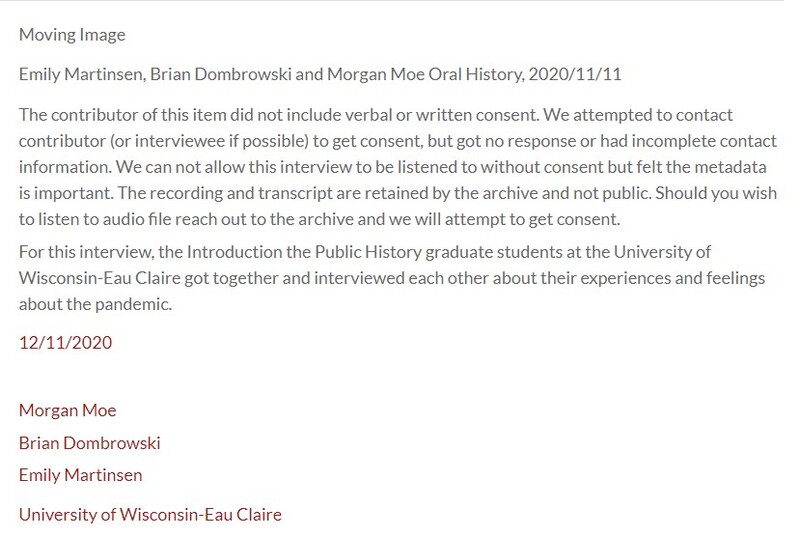 12/11/2020
12/11/2020Emily Martinsen, Brian Dombrowski and Morgan Moe Oral History, 2020/11/11
The contributor of this item did not include verbal or written consent. We attempted to contact contributor (or interviewee if possible) to get consent, but got no response or had incomplete contact information. We can not allow this interview to be listened to without consent but felt the metadata is important. The recording and transcript are retained by the archive and not public. Should you wish to listen to audio file reach out to the archive and we will attempt to get consent. -
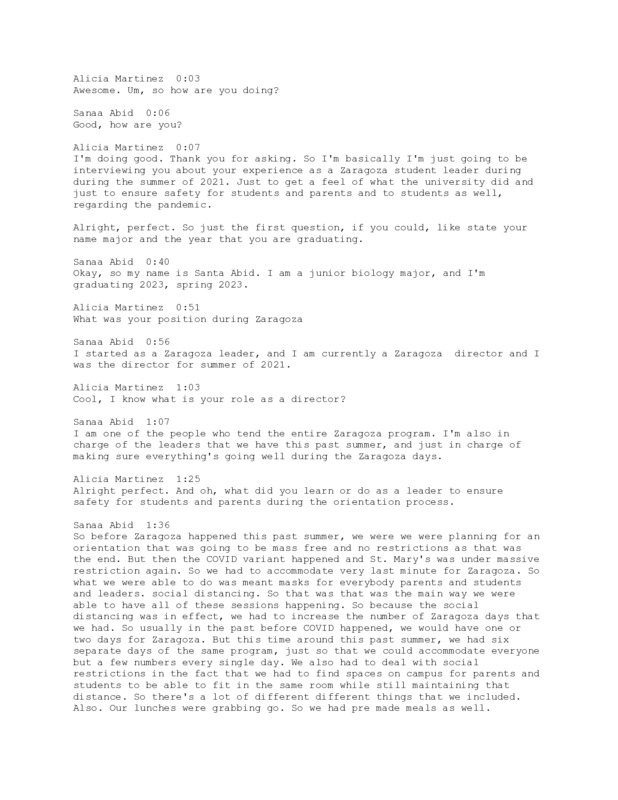 2021-11-29
2021-11-29Sanaa Abid Oral History, 2021/11/29
This is an audio interview of Zaragoza director Sanaa Abid. She gave a behind the scenes looks into how the student orientation was organized working with other campus facilities to ensure a safe program for students and parents. She offered insight as her roles from a new student, a student leader, and a student director. From this interview, we are able to gain a better understanding of what the directors did during Zaragoza and how they accommodated to Covid-19. Students were able to still have an experience that allowed them to connect with other students and their families while still having a safe experience. From this interview, we can tell that the St. Mary’s Community came together to understand the different actions that were taken to ensure the program ran smoothly. Furthermore, Sanaa offered her unique experience from attending Zaragoza as a new student prior to Covid, a first time Zaragoza leader during 2020, and finally as Zaragoza Director during the summer of 2021. -
 2021-11-28
2021-11-28JOTPY High School Reflection
This is the optional extra credit assignment given to students at Garden Grove High School in Orange County, CA to complete over Thanksgiving Break. For context, these students are juniors who experienced school closure during their freshman year, spent their entire sophomore year over Zoom, and did not set foot on campus again until the first day of school this year. Garden Grove High is a Title One school that serves a population where 65% of students are identified as economically disadvantaged. The ethnic/racial breakdown of the student body is: 50% Hispanic, 41% Asian, and 6% White. -
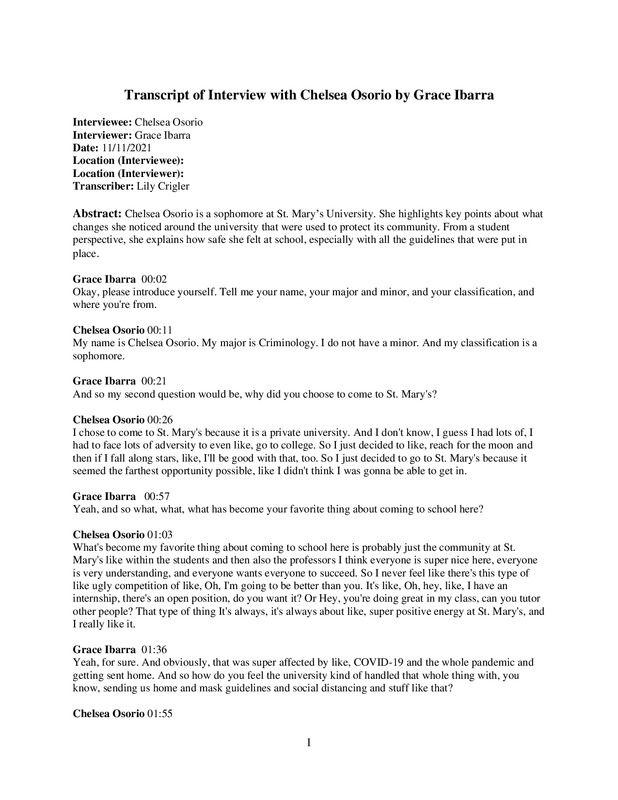 2021-11-11
2021-11-11Commuter Student Perspective on University Changes
Chelsea Osorio is a commuter student at St. Mary’s University and among the many personally affected by the COVID-19 pandemic. In her interview she highlights key points about what changes she noticed around the university that were used to protect our community. From a student perspective, she explains how safe she felt at school, especially with all the guidelines that were put in place. This goes to show how St. Mary’s students, faculty, and staff were committed to ensuring not only a healthy online environment but also making sure we returned to a safe and healthy community. -
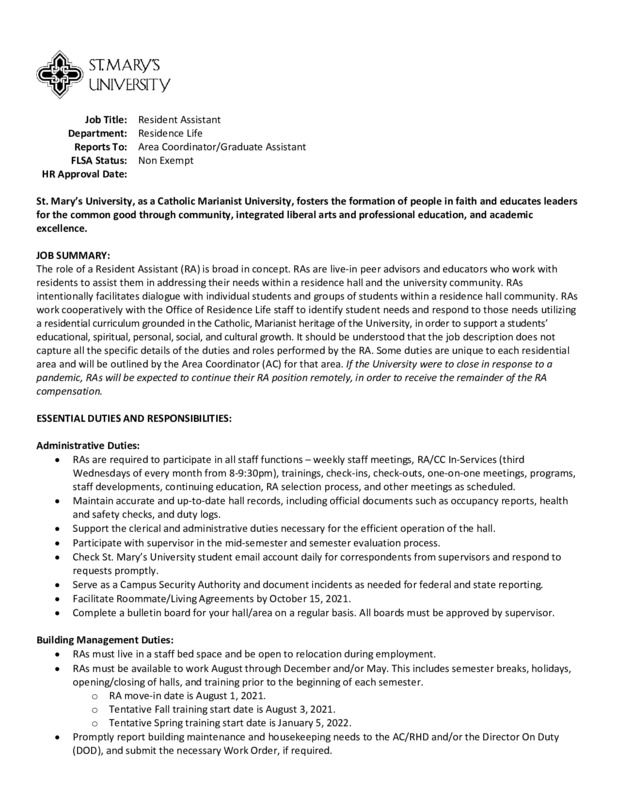 2021-08-16
2021-08-16Fall 2021: Creating Community No Longer Virtual
After attending college online and having virtual classes, many students were eager to come back to the St. Mary’s University community. However, creating a community has looked different from pre-covid semesters. Before the pandemic hit, student life and university programming council hosted many events. Residence life and resident assistants also hosted events for residents in the dorm halls. When everything was virtual resident assistants tried engaging with residents and creating community online. This consisted of watching movies, playing games, or just having a space to talk to each other. Now that residence halls are open and most classes are in-person, creating community looks a bit more like pre-covid semesters. Resident assistants are required to create engagement opportunities for their residents. There are several ways to do this like traditional planned programs, spontaneous get-togethers, bring-along events, etc. Although the programs resemble pre-covid semesters more than the last three semesters, covid is still something to beware of. When planning events, resident assistants consider how many people might attend, whether the space is indoors or outdoors, will there be food, etc. Resident assistants are also required to uphold and enforce covid policies like mask-wearing. So, while also trying to create a sense of community, residence life and student staff still try to create a safe environment. -
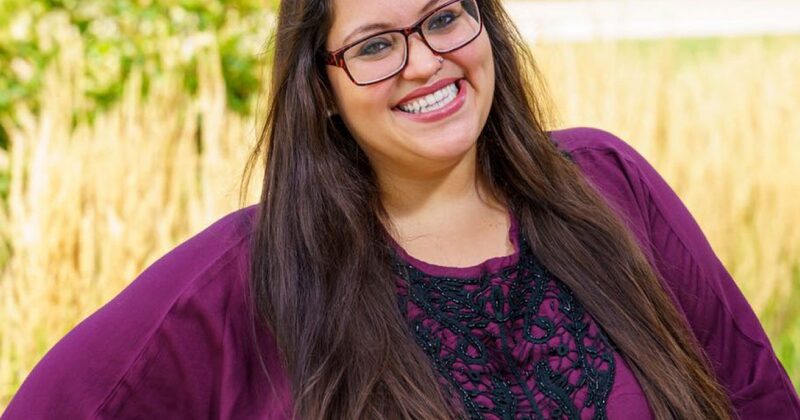 2021-11-23
2021-11-23A new Director for a renewed office
Maria Del Mar Aponte Rodriguez is the new Director for the Center of International Programs at St. Mary’s University. After a semester of being in charge, Aponte tell us more about her experience as the new leader in the office and her future goals to make the CIP Office more open and warming for international students. As COVID has impacted several levels of the office, Aponte comments how she overcome these issues and how she is preparing a new plan of action for Fall 2022. -
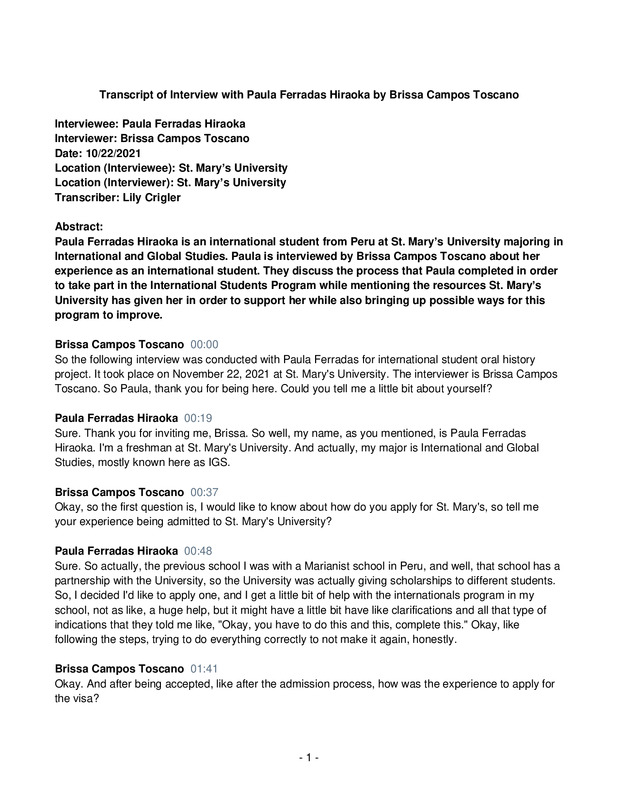 2021-11-22
2021-11-22Paula Ferradas Oral History, 2021/11/22
Paula Ferradas Hiraoka is an international student at St. Mary’s University from Lima, Peru. After applying last year to St. Mary’s, Ferradas has come to the U.S to start her dream to become a good professional. In this interview we ask her experience as a new international student and how the resources in the university have given her the possibility to grow. -
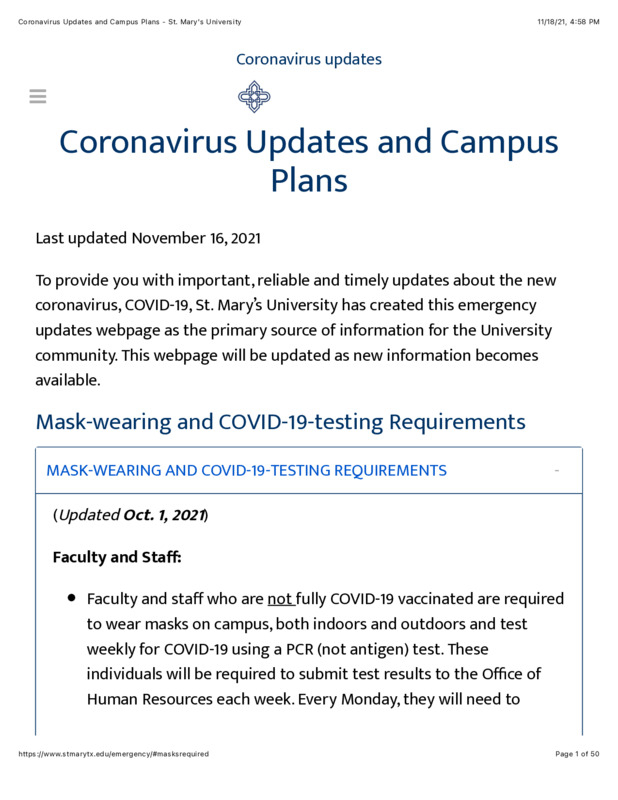 2021-08-16
2021-08-16Fall 2021: Another Semester of Transition
Returning to campus in Fall 2021 after three semesters at home has been interesting, to say the least. It has been a semester of transition and relearning for students, faculty, and staff. Fall 2021 semester has required learning to be away from family again, living in dorms, being in a classroom, etc. As a first-time resident assistant during this time of great change and uncertainty, there has been a learning curve. Being a resident assistant and working for the office of residence life has made it clear that covid-19 changed the way students experienced college. It's evident that the current student population (first-year students to fourth-year students) do not share a “normal” first-year experience. Fall 2019 first-year students never experienced a complete spring semester on campus. Fall 2020 first-year students had the option to live on campus but all classes and all or most campus resources were virtual. Fall 2021 first-year students are the first group to experience St. Mary's as it is now with its current policies. As a resident assistant during this time, it is imperative to take these unique experiences into account when serving as a campus resource. Covid-19 has also required the implementation of policies to keep the community safe. For the dorm halls, resident assistants are the ones to uphold and enforce policies that require residents to wear facemasks outside of their personal living spaces. So, in an already complicated and uncertain time, resident assistants must hold each other and their peers accountable. -
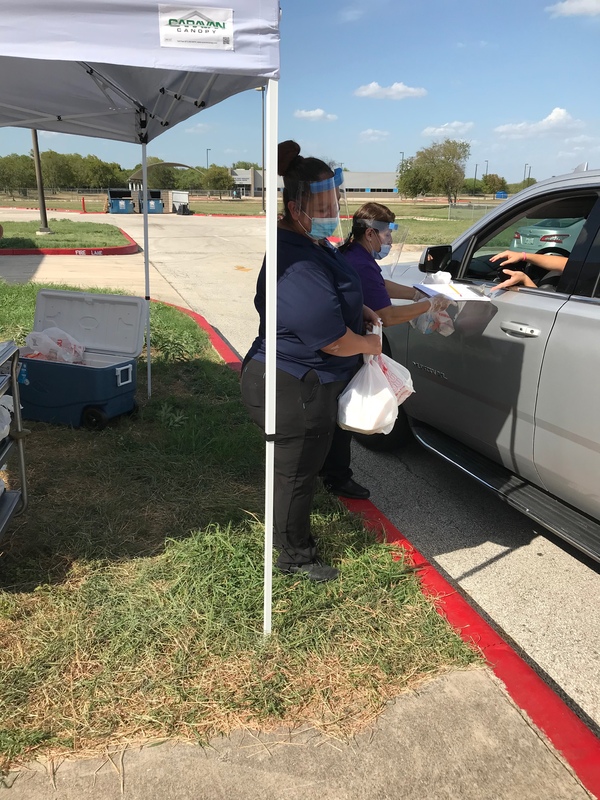 2020-08-12
2020-08-12Lunch Time
With the closing of schools, many students no longer had access to a warm and healthy lunch provided by the federal government. Kids from lower income families often rely on school to provide them with at least two meals a day, but because of COVID-19 they no longer could eat certain breakfast like oatmeal and lunch such as, carne guisada, that they have been used to consuming. In order to address this problem, schools began setting up times for parents to come and collect food for their kids three times a day. Ultimately, due to lack of personal time, parents were picking up breakfast, lunch and snacks for three days on Friday. -
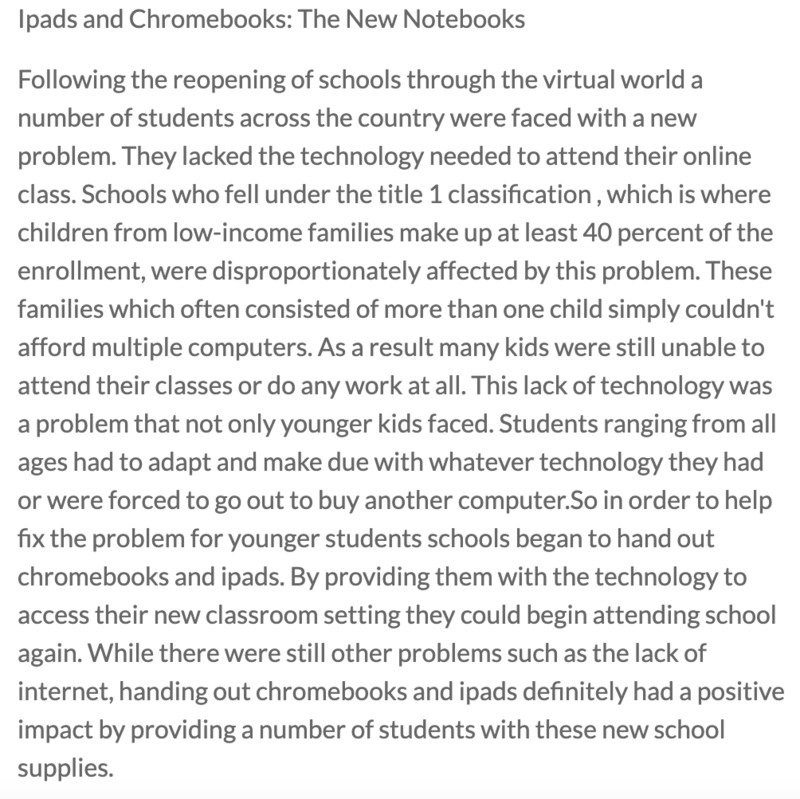 2020-08-11
2020-08-11Ipads and Chromebooks: The New Notebooks
Following the reopening of schools through the virtual world a number of students across the country were faced with a new problem. They lacked the technology needed to attend their online class. Schools who fell under the title 1 classification , which is where children from low-income families make up at least 40 percent of the enrollment, were disproportionately affected by this problem. These families which often consisted of more than one child simply couldn't afford multiple computers. As a result many kids were still unable to attend their classes or do any work at all. This lack of technology was a problem that not only younger kids faced. Students ranging from all ages had to adapt and make due with whatever technology they had or were forced to go out to buy another computer.So in order to help fix the problem for younger students schools began to hand out chromebooks and ipads. By providing them with the technology to access their new classroom setting they could begin attending school again. While there were still other problems such as the lack of internet, handing out chromebooks and ipads definitely had a positive impact by providing a number of students with these new school supplies. -
 2021-11-01
2021-11-01Getting Funds to get Students Home due to COVID-19 Pandemic
When this series of emails was sent to St. Mary's Faculty and Staff it really hit hard and really touched me. I didn't realize that some students did not have any means of getting back home, students were not prepared for this at all and due to the pandemic all dorms and classes were cancelled, they were worried they would not make it home. So, St. Mary's sent an email out reaching out to everyone that was able to give funds and send students home. When this pandemic hit us no one was prepared for what was to come. -
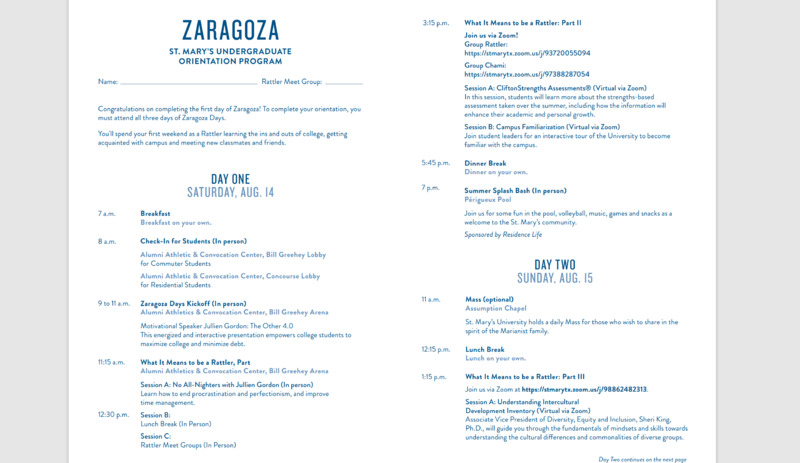 2021-08
2021-08Zaragoza Orientation Program
This orientation program shows the different accommodations that have been made to ensure a safe experience during Zaragoza days. Prior to the pandemic, the events scheduled for students would be held in person so that students would have the opportunity to interact face to face and make new connections with other students. However, the Zaragoza days held in August 2021 integrated both in person and online orientation events. This program shows that some of the scheduled events were held on Zoom during different sessions. This was to ensure that students were provided with safe and easy access to learn more about being and undergrad at St. Mary's while not completely limiting their orientation experience by still holding in person events that adhered to Covid-19 guidelines. -
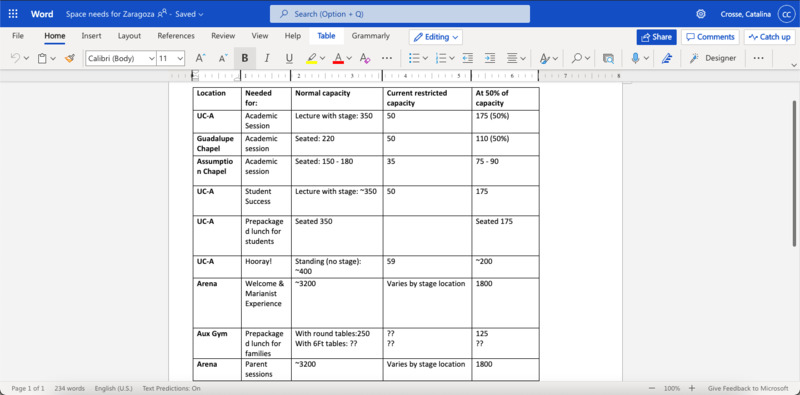 2021-08
2021-08The Zaragoza Project: A Covid Experience
For this item, I wanted to highlight the differences in the Zaragoza student orientation for incoming freshmen and transfer students. This is a program that happens at the beginning of every school year. My class, entering St. Mary's in Fall 2019 was the last class to have a normal experience prior to the pandemic. However, since the pandemic, many operations have had to change to ensure the safety of those involved. The Fall 2020 Zaragoza experience was entirely over zoom. With the school now transitioning back to in person teaching, Zaragoza leaders had to the opportunity and challenge to create a Zaragoza experience like never seen before that provided safe interaction among all students and parents. These screenshots specifically showed a rushed project that needed to be approved in a short amount of time that accommodated both to the universities expectations while following the state's guidelines. -
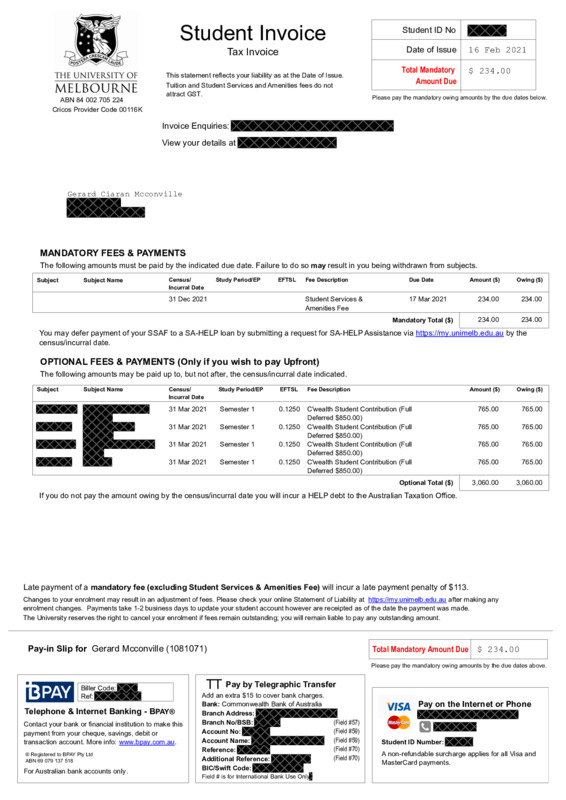 2021-03-01
2021-03-01Amenities Fee - HIST30060
Despite not having been able to attend my university campus for the prior year and not being able to attend it in the coming year as a result of lockdown restrictions, I was still forced to pay an amenities fee to the university. This meant that I had restricted access to the amenities that I was still paying full price for. This combined with losing my job made the payment difficult to make. -
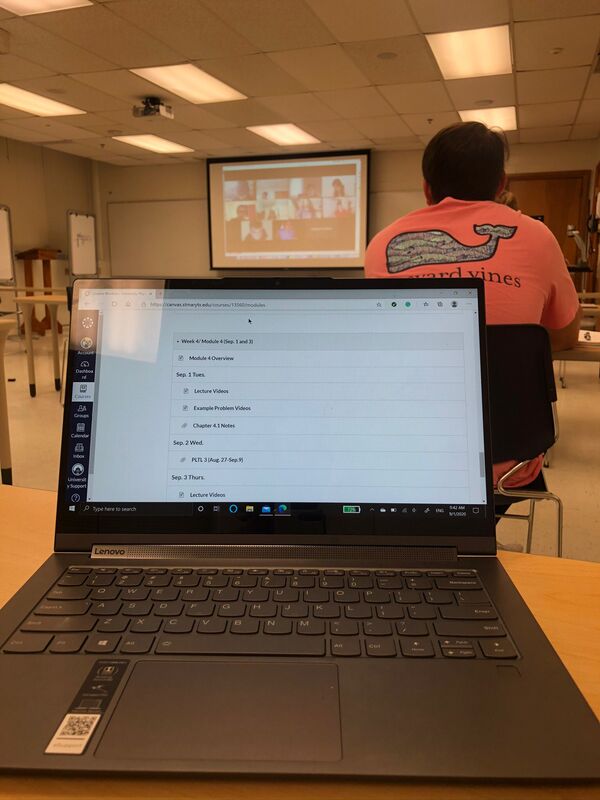 2020-09-01
2020-09-01Every story matters - Student's perspective
Classes in Fall 2020 were either fully virtual or hybrid. In hybrid classes, the professors would have to put the projector with some students being on zoom. This was a good idea because it helped students be safe and at the same time learn. It was also challenging because sometimes professors would pay more attention to the students that were in the classroom and not the ones on zoom. I took this picture a year ago to show my parents how classes were working. This was something my parents appreciated because they saw that St. Mary’s University was using all their resources to help students continue their studies. They liked seeing me continue my college experience in a different way but not fully virtual. I saved this picture for over a year to see the changes the world was going to have during the pandemic. I am glad we are finding new solutions and making changes with still being careful with COVID-19 guidelines. -
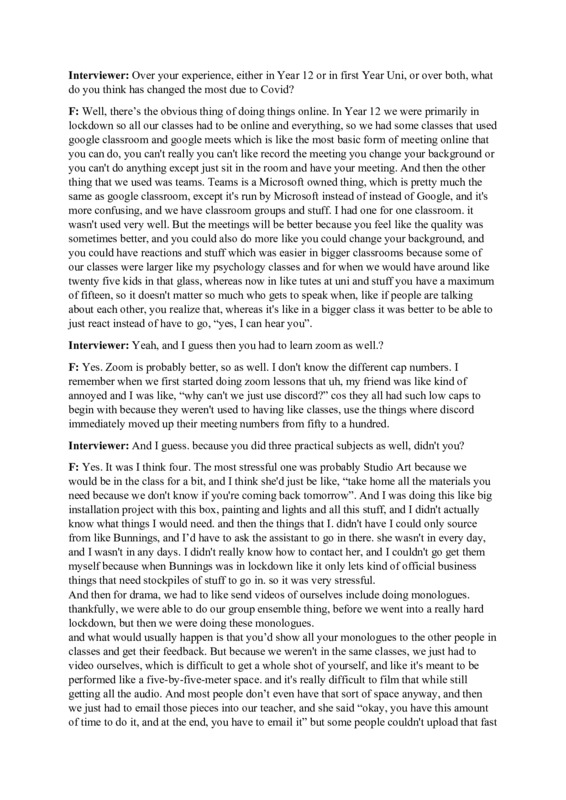 2021-10-15
2021-10-15HIST30060: From Year 12 to First-Year University
I interviewed my younger sibling, 'F', and transcribed the audio. They completed Year 12 in 2020 and then began university in 2021, which I believe is a significant transitionary time especially in the context of Covid to document. Their experiences in using different media forms for online classes is insightful and provides an interesting comparison. Additionally they provide insights into changing interests, socialising online, and reflecting on the world around them. They reflect on how they believe the nature of people has changed in relation to each other in an isolated but connected world, which I believe will be an interesting and informative insight for the future to gain an indepth understanding of the Covd-19 era from the perspective of the youth. -
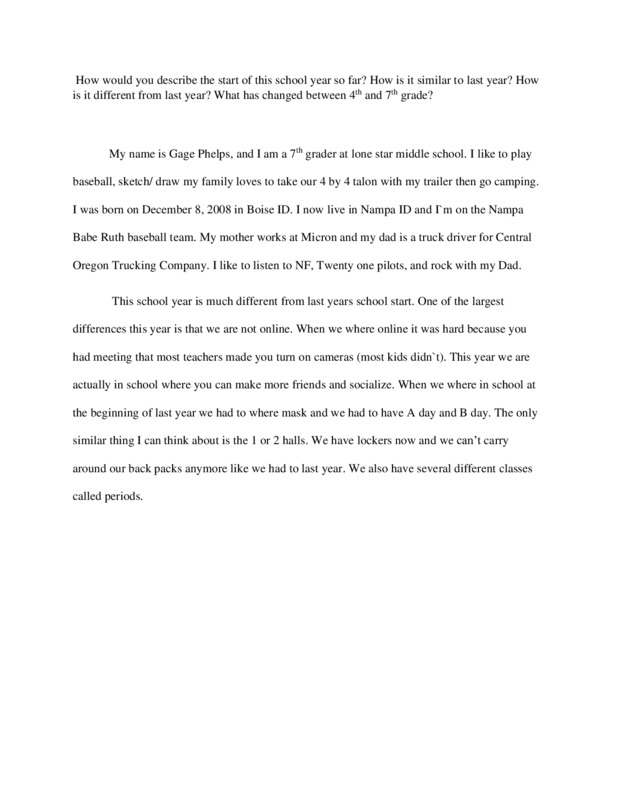 2021-10-08
2021-10-08Covid-19 win assignment
My name is Gage Phelps, and I am a 7th grader at lone star middle school. I like to play baseball, sketch/ draw my family loves to take our 4 by 4 talon with my trailer then go camping. I was born on December 8, 2008 in Boise ID. I now live in Nampa ID and I`m on the Nampa Babe Ruth baseball team. My mother works at Micron and my dad is a truck driver for Central Oregon Trucking Company. I like to listen to NF, Twenty one pilots, and rock with my Dad. This school year is much different from last years school start. One of the largest differences this year is that we are not online. When we where online it was hard because you had meeting that most teachers made you turn on cameras (most kids didn`t). This year we are actually in school where you can make more friends and socialize. When we where in school at the beginning of last year we had to where mask and we had to have A day and B day. The only similar thing I can think about is the 1 or 2 halls. We have lockers now and we can’t carry around our back packs anymore like we had to last year. We also have several different classes called periods. -
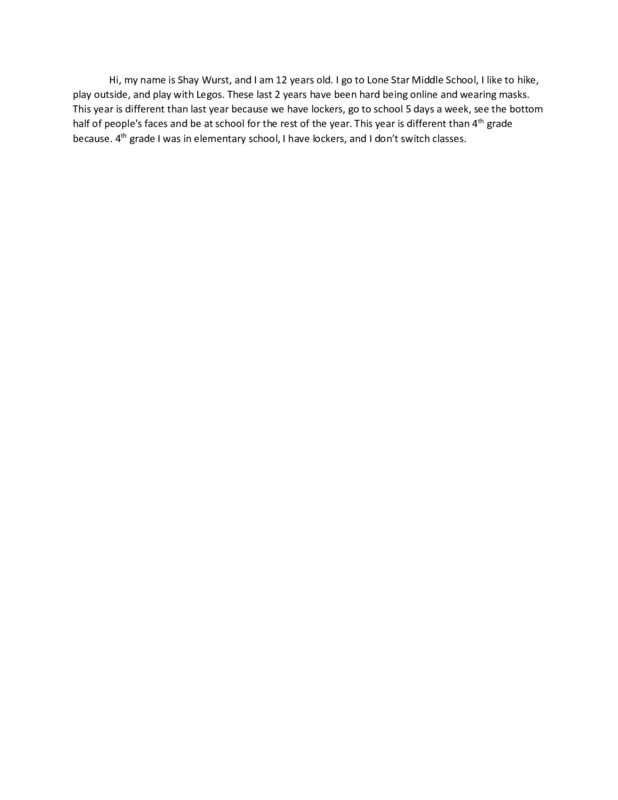 2021-10-08
2021-10-08My life During the Covid 19 Outbreak
Hi, my name is Shay Wurst, and I am 12 years old. I go to Lone Star Middle School, I like to hike, play outside, and play with Legos. These last 2 years have been hard being online and wearing masks. This year is different than last year because we have lockers, go to school 5 days a week, see the bottom half of people's faces and be at school for the rest of the year. This year is different than 4th grade because. 4th grade I was in elementary school, I have lockers, and I don’t switch classes. I very happy that this year is better than last year. -
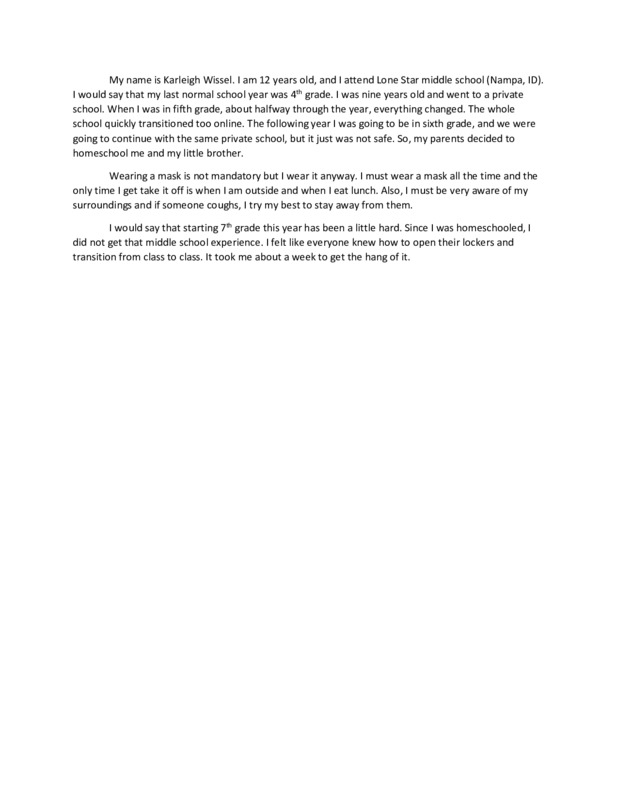 2021-10-08
2021-10-08Then and Now
My name is Karleigh Wissel. I am 12 years old, and I attend Lone Star middle school (Nampa, ID). I would say that my last normal school year was 4th grade. I was nine years old and went to a private school. When I was in fifth grade, about halfway through the year, everything changed. The whole school quickly transitioned too online. The following year I was going to be in sixth grade, and we were going to continue with the same private school, but it just was not safe. So, my parents decided to homeschool me and my little brother. Wearing a mask is not mandatory but I wear it anyway. I must wear a mask all the time and the only time I get take it off is when I am outside and when I eat lunch. Also, I must be very aware of my surroundings and if someone coughs, I try my best to stay away from them. I would say that starting 7th grade this year has been a little hard. Since I was homeschooled, I did not get that middle school experience. I felt like everyone knew how to open their lockers and transition from class to class. It took me about a week to get the hang of it. -
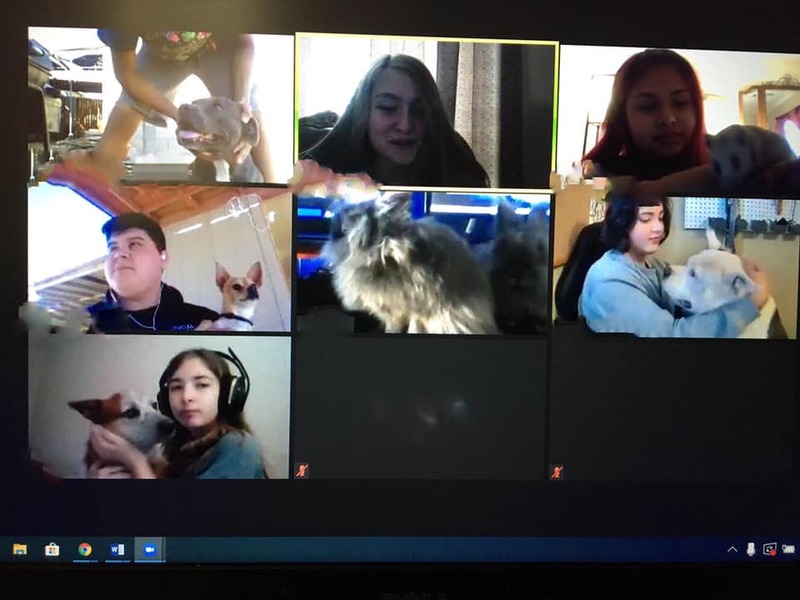 2020-12-16
2020-12-16Bring Your Pet to School Day: Quarantine Edition
2021-2022 is my second year being a middle teacher, but it feels like my first. Teaching for the first time last year was a whirlwind. From teaching students how to use their devices to pull up our class page and join a Zoom meeting to getting all of the technology to work on my end, it proved difficult many times. Not to mention, kids enjoyed the luxury of crawling right out of bed and attending class. Sleepy faces, tons of distractions, and technological difficulties made up about 90% of remote learning. However, there were often fun moments where we could put aside the learning for just a bit and focus on lifting each other up and getting to know each other. I took one day to have a "bring your pet to class" party. It ended up being much more convenient than bringing animals to "real" school anyway. The kids ran across their house looking for their pets and brought them up to their screens. Some had multiple pets to show off! Moments like these made 2020 memorable--for good reasons. -
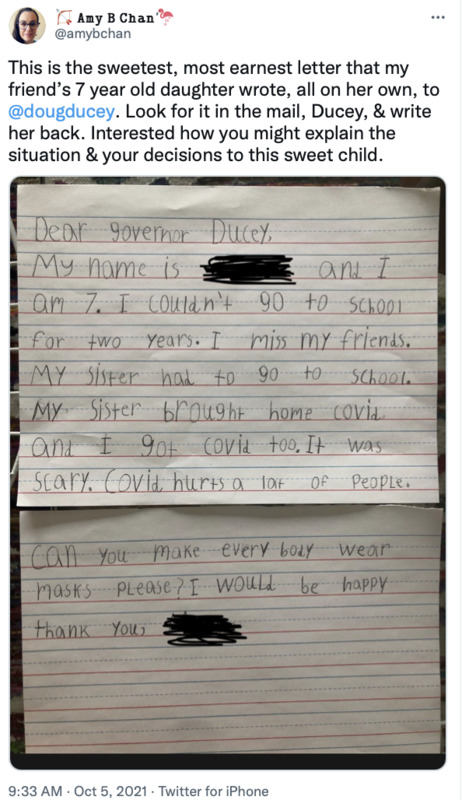 2021-10-05
2021-10-05Child's Letter to Doug Ducey
Twitter user @amybchan tweeted a photo of a letter that a 7-year-old student wrote to Governor Doug Ducey. She tells him that she and her sister both got COVID and asks him to make masks at school mandatory. Governor Ducey has not only refused to mandate masks at K-12 schools in Arizona but he has punished public school districts in the state that have chosen to require masks by withholding federal funding meant for COVID mitigation strategies. Parents, students, and educators have been outspoken about this policy and the federal government has weighed in over the mishandling of these COVID relief funds. My children are in a district that requires masks and have put in a grant application for those specific funds but have been told that it is "pending review" and has not released the money to the district. It is hurting districts who are actually trying to keep students and families safe and rewarding schools for not following proven mitigation strategies. At a time when children under 12 cannot get the vaccine this is especially troubling to many Arizona families. -
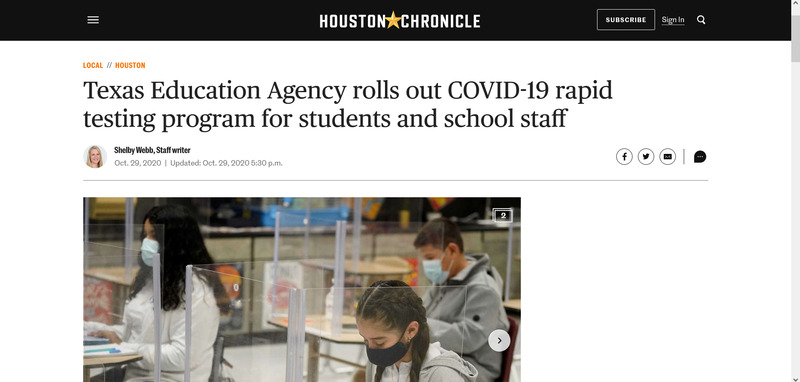 2020-10-29
2020-10-29COVID Testing in Schools
This article informs of the Texas Education Agency's decision to provide covid testing kits to school districts throughout the state. The testing kits were purchased from the U.S. Department of Health and Human Services and were to be distributed by size of district and rate of infection. From there, the school districts could decide how to make these available to students and staff. -
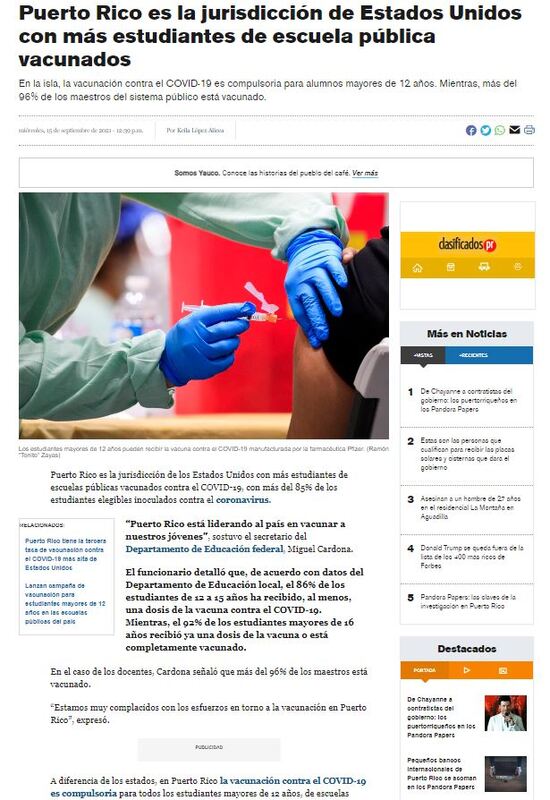 2021-09-15
2021-09-15Puerto Rico es la jurisdicción de Estados Unidos con más estudiantes de escuela pública vacunados
Puerto Rico es la jurisdicción de los Estados Unidos con más estudiantes de escuelas públicas vacunados contra el COVID-19, con más del 85% de los estudiantes elegibles inoculados contra el coronavirus. “Puerto Rico está liderando al país en vacunar a nuestros jóvenes”, sostuvo el secretario del Departamento de Educación federal, Miguel Cardona. El funcionario detalló que, de acuerdo con datos del Departamento de Educación local, el 86% de los estudiantes de 12 a 15 años ha recibido, al menos, una dosis de la vacuna contra el COVID-19. Mientras, el 92% de los estudiantes mayores de 16 años recibió ya una dosis de la vacuna o está completamente vacunado. En el caso de los docentes, Cardona señaló que más del 96% de los maestros está vacunado. “Estamos muy complacidos con los esfuerzos en torno a la vacunación en Puerto Rico”, expresó. A diferencia de los estados, en Puerto Rico la vacunación contra el COVID-19 es compulsoria para todos los estudiantes mayores de 12 años, de escuelas públicas y privadas, así como de educación superior. Solo están exentos de cumplir con este requisito aquellos alumnos y empleados de centros educativos que padezcan alguna condición de salud que no le permita ser vacunado o por consideraciones religiosas. -
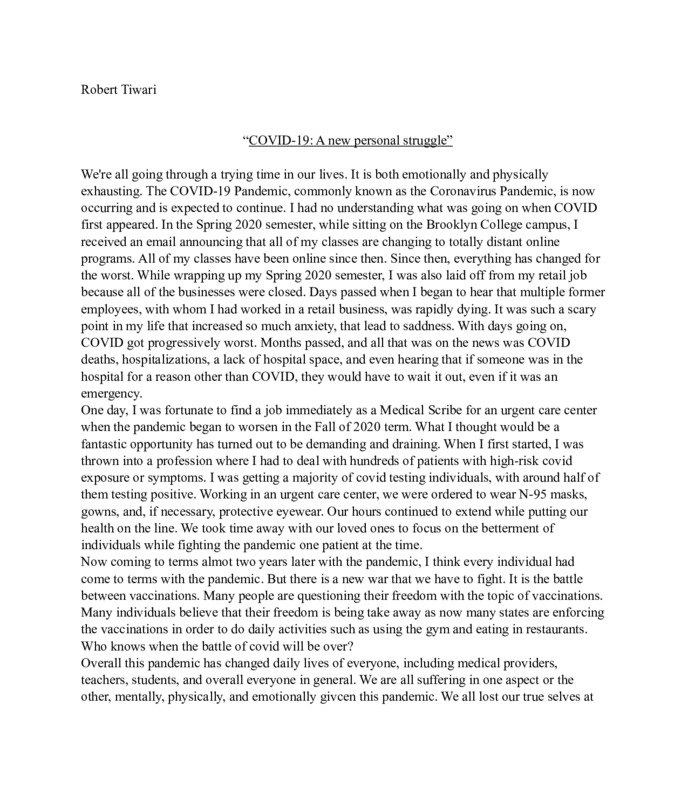 2021-09-30
2021-09-30COVID-19: A new personal struggle
My experience has changed overall with this pandemic. In my paper I discussed the different aspects of how my life changed given the circumstances with work, school, and personal lifestyle. -
2021-04
Teleworking: Good and Bad
I started a job earlier this year that is entirely remote. Before COVID-19, I would never have considered a remote job/ the possibility of teleworking simply because I thought it was something that wouldn't be possible in the field of History. Obviously this all changed when things shut down in 2020- and in some ways, the work realm changed for the better. I was able to secure a remote job relevant to my field for good pay, something that would not have been possible before the pandemic. On the other hand, working entirely remote makes it much harder to connect with coworkers and get out of the house.
